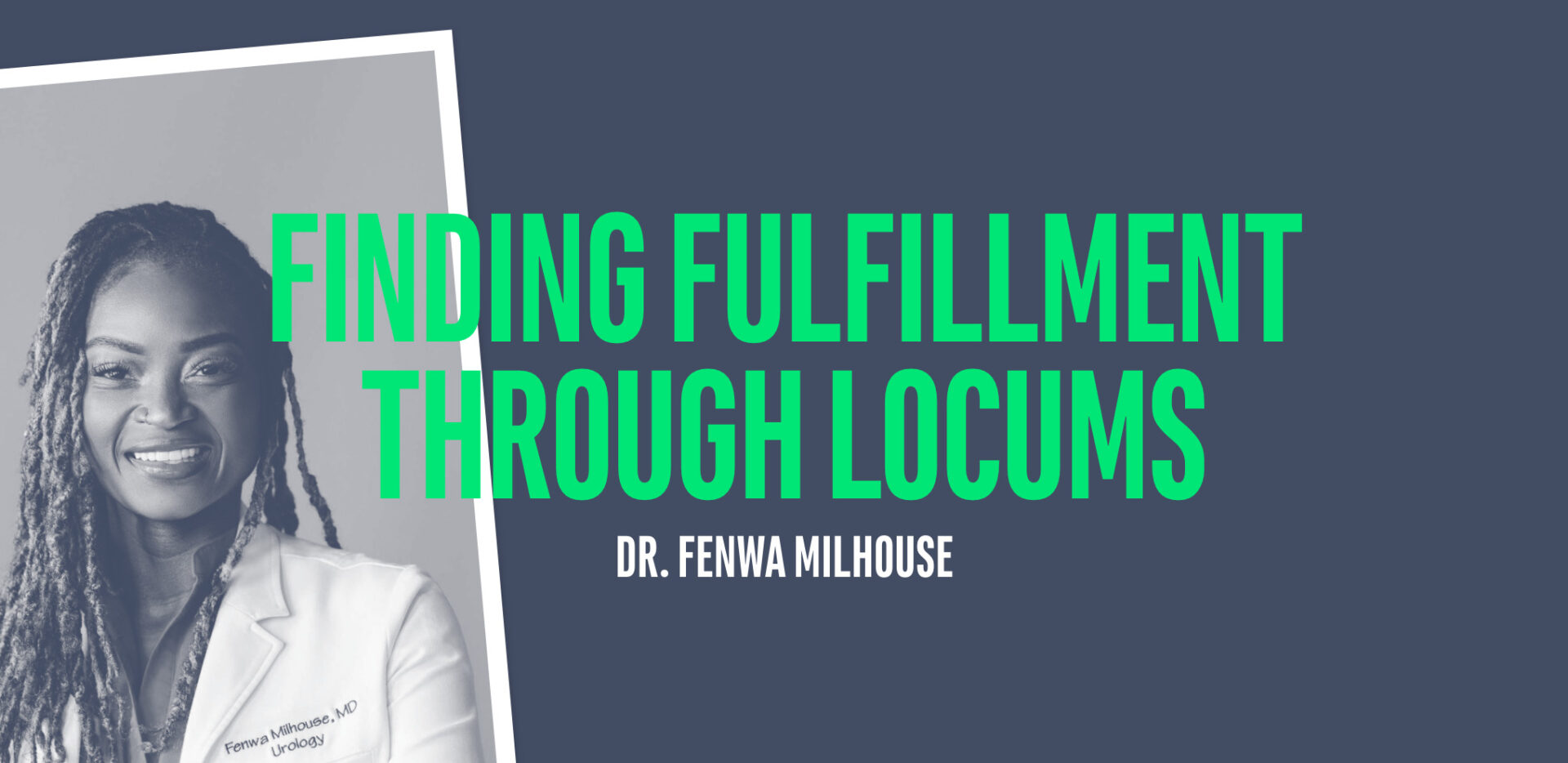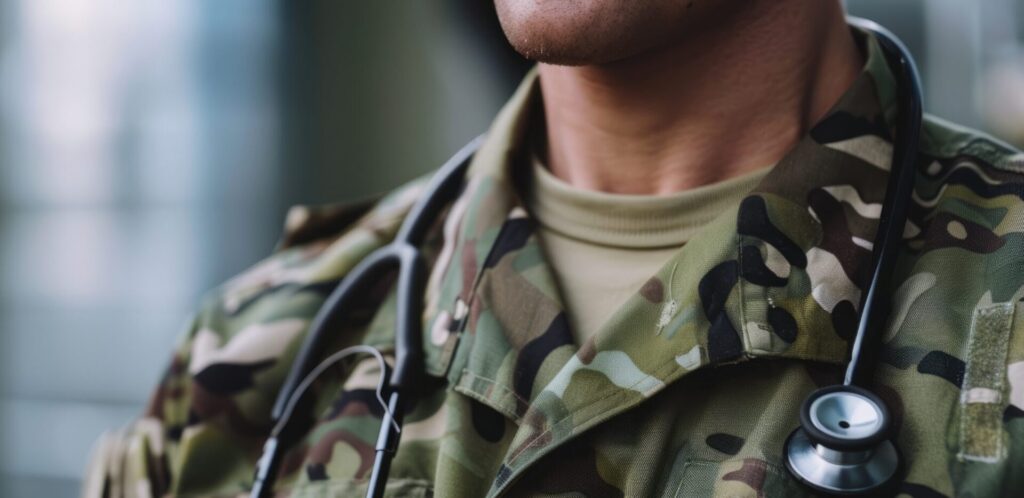One of the most unexpected benefits of locum tenens for many physicians is how fulfilling it can be: allowing you to connect with patients in need of your specific skill set, while still leaving time for you to connect with yourself and your family, too.
Urologist Dr. Fenwa Milhouse is a great example. When Dr. Milhouse was looking for a way to transition out of her previous practice, she had no idea that locums was an option for urologists like her. “I didn’t think urologists did locums,” she told us. “I was like, urology locums? Is that a thing?”
In many ways, it was similar to her trajectory toward becoming a urologist, which she initially thought of as a specialty that was for men, by men. “I didn’t have any inclination that there was any room for a woman to become a urologist,” she said, “certainly not a Black woman.”
But an encounter in medical school changed her perception, leading Dr. Milhouse to fall in love with urology, and ultimately to become one of the leading voices in her field. More recently, as a physician practicing locum tenens urology full time, she has found an unexpected degree of fulfillment in caring for and connecting with patients in areas that don’t have consistent access to urological care.
We interviewed Dr. Milhouse about the path to becoming a urologist, why she feels so passionately about the importance of representation in urology and medicine as a whole, and the benefits of locum tenens to her urology practice.
Here’s what she had to say:
What drew you toward practicing medicine in general, and to choosing urology in particular?
I always knew I wanted to be in medicine. Growing up in an immigrant family, in a Nigerian household, we were encouraged to achieve a high level of education. So I knew I wanted to be a doctor from a young age.
But I didn’t know what kind of doctor I wanted to be. I didn’t even know what urology was until I got to medical school. I had to look it up on my own, and when I learned about it, I came to the conclusion that it was kind of a male gynecologist, and therefore it was for men, by men. I didn’t have any inclination that there was any room for a woman to become a urologist, certainly not a Black woman. I didn’t see myself as a surgeon either, at this point. I didn’t have representations of diversity in these specialties at all.
But when I was a second year medical student, we were given a brief lecture by Dr. Lenaine Westney, who was the Interim Chair of Urology at the University of Texas Houston medical school at the time. I was amazed and starstruck, that this was a Black woman who was a urologist. I was really drawn to her, and drawn to this field.
When I spent time shadowing her and her colleagues in urology, I learned about how fun and cool urologists really are. It’s not just for men. There’s a whole subspecialty of Urology that is primarily focused on women. And I thought, this is what I want to do with my life.
It changed my whole career projection. To see myself for the first time in that way––that representation made a huge difference.
It changed my career. It’s easy to talk about urology, because I love what I do, but I would not have been sitting here doing this without that representation. And to whom much is given much is required. I have been given much and therefore, it behooves me to be present, to be available, to be visible. That’s why it’s important to me to be engaged, especially on social media avenues. I’ve gotten messages and the notes that I’ve gotten from people around the world thanking me for being visible in that way, for presenting a different type of doctor.
I imagine that visibility does a lot for patients too, in making this branch of medicine feel a little bit accessible to people who might not otherwise seek out care.
You’re absolutely correct. I think what I do is be myself. Being yourself is a powerful tool that we all have, because then we allow people to see us and think, oh, you’re like me, and now they don’t feel like going to the doctor is as scary and intimidating.
Patients consistently thank me for making them feel comfortable. That’s the first part of doctoring: we have to speak to the person. Before I can give you my advice, you have to be able to trust me, and part of that trust is building rapport.
What led you to decide to try locum tenens urology?
I was looking to break out of my previous practice. Locums was something that I heard about, but I didn’t think urologists did locums. But then I met a colleague in my same subspecialty who told me that he’d been doing locums for a couple years, and he was really happy. Getting that personal feedback about locums and what it’s like really helped.
Locums is a great way to transition in one’s career, if you’re looking for something different, but you’re not ready to give up medicine completely. And I was not ready to give up urology. I love urology, I love taking care of patients.
What are some of the aspects of locums that you’ve found most rewarding?
Locums is a great way to feel like you’re doing work that matters. Because these are places that really need a urologist. There’s a need for urologists everywhere, but in Chicagoland, you have a bunch of choices. But in a lot of other places, where they don’t have a full-time urologist, patients are so grateful to be taken care of, because they’ve been on the waitlist for months and months.
It’s also a great way to see a different side of urology. I trained in Chicago, and that’s where I’ve done most of my work. So I’ve only known urology in a busy big metropolitan area. I had never practiced it in a more rural area. And locums allows you to do that––you get more of a diversity of experience, when you practice medicine that way.
One of the things we hear from other physicians is that locums gives them the opportunity to spend more time with patients. Has that been your experience as well?
Yes. I came from a practice where I was really, really busy. I didn’t feel like I was able to spend as much time with patients as I would have wanted. It was kind of a drag race every week––sometimes up to forty patients coming into clinic during a day, and then all the non-face-to-face patient things that we have to do.
In locums, it’s less busy, even though there’s a bigger need, so I get to spend more time talking to people. Especially in a small town, it makes you feel a part of the community.
I’ve always felt very close to my patients. I have tons of patients from my previous practice that I’m very close to. But it was harder to feel a part of that community––it took longer. I think it’s easier to be that way in locums because of the nature of these assignments.
Even though I don’t live there, by my first two weeks in my locums assignment, I already started to feel like I was part of the community. I wasn’t expecting that. I saw it as a job–– I thought I would just do my work and then go home. And then I found myself going back home thinking, this is my community. I have to make sure I can be the best urologist for them as I can be, and care for these people.
I was going to go in and be the best urologist regardless, but I’m just so grateful that my experience has so far been awesome. There have been so many thank yous and so much appreciation.
What advice would you give to other locums providers thinking of trying locums for the first time?
I would absolutely recommend that they try it. I’ve already been recommending it to colleagues and friends of mine.
First, you have to make sure that it’s right for your family. I am not only a urologist, I’m a wife, I’m a mother. I have a nine year old at home, I have older kids that are in college, I have a husband. So first and foremost I had to make sure that it was okay for our family, because it did require me being away for a week at a time, or days at a time.
But even though I’m away sometimes, when I’m here, I’m here. When I was practicing every day, I was a lot busier, getting home late and leaving home early. But now, I can be here when my daughter comes home from school, and be there to drop her off at the bus stop and help her with math and all these other things that I wasn’t able to do on a day-to-day basis before locums.
Locums is a great way to practice medicine that is more lifestyle friendly. It’s less stressful: you get more time off, and you’re not seeing patients every five minutes. Especially if you’re on the brink of complete burnout, it’s a way of combating that but still practicing.
And it can be so fulfilling, as we’ve talked about. My second time practicing locums I realized that I was looking forward to clinic. [laughs] I couldn’t remember the last time I had thought that! Again, I love what I do, but medicine is a lot. It can be really draining. So when I tried locums, I thought: this is the way medicine should be practiced.
*This interview has been edited for clarity and length.



